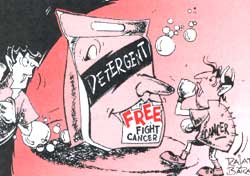Washed and cleaned
 HOW do you kill cancer? It is a question that researchers the world over have been trying to answer. They have tried everything: conventional chemotherapy to blocking blood flow to cancerous tissues. Nothing, however, deterred the dreaded disease. So the research teams went back to their laboratories and tried again, attempting to devise better and more effective ways to fight the disease. And now, the Canadians think they might be on to something.
HOW do you kill cancer? It is a question that researchers the world over have been trying to answer. They have tried everything: conventional chemotherapy to blocking blood flow to cancerous tissues. Nothing, however, deterred the dreaded disease. So the research teams went back to their laboratories and tried again, attempting to devise better and more effective ways to fight the disease. And now, the Canadians think they might be on to something.
What is common to chemotherapy and household detergents? Both fight cancer. That's right, say Canadian researchers who think that a detergent in cleaners may prove to be a powerful weapon against multidrug-resistant tumours. They say it greatly enhances the effect of cancer-killing drugs by clogging a protein that cancer cells use to pump out the drugs.
For over two decades now, researchers have known that if cancer cells produce the P-glycoprotein pump, they become resistant to a wide range of drugs. However, the same protein is also produced in some healthy tissues, such as the gastrointestinal tract and the kidney. "We understand its role in cancer," says Jeffery Charuk, a biochemist at the University of Toronto, Canada. "But we wanted to know what it was doing normally."
To find out, Charuk focused on the kidney, since whatever the renal p-glycoprotein binds to would be pumped into the urine. The problem was that the pump binds to many commonly-used drugs, so the researchers needed a source of urine guaranteed to be drug-free. Charuk volunteered and collected samples of his urine for analysis for three years.
The researchers then treated multidrug-resistant cancer cells with the urine. They reasoned that any substance that binds to P-glycoprotein should enhance the ability of anticancer drugs to destroy tumour cells, since the protein would pump out this substance rather than the drugs. Sure enough, they were able to purify a chemical that enhanced the killing ability of chemotherapy drugs a hundred-fold. Even by itself, this substance had some cancer-killing ability.
The surprise was the substance's identity: nonylphenol ethoxylate (NPE), a synthetic detergent used in dishwasher powder, window cleaners and hard surface cleansers (American Journal of Physiology, Vol 274). "We were really amazed," says Charuk.
"This is important work," says biochemist Richard Beliveau of the University of Quebec in Montreal, Canada. "It shows the biological role of P-glycoprotein goes well beyond cancer." The work suggests, he adds, that p-glycoprotein evolved to eliminate natural toxins in plants, such as taxol. The irony is that some of these toxins are now being used as anticancer agents. "Cancers take advantage of the fact this protein evolved to eliminate any compound that doesn't serve a metabolic use."
Charuk believes detergents like NPE are attractive candidates for new anticancer agents as they are cheap and abundant - more than 600,000 tonne are produced annually. They are also less toxic than most anticancer drugs and are easily flushed out of the body. Charuk's team is now eager to test the effect of NPE on tumours in laboratory animals.
There is a downside to NPE, however - it weakly mimics the hormone oestrogen. Such chemicals have been blamed for falling sperm counts, and NPE is banned in many European nations. Charuk believes that he will be able to find less controversial detergents that can still help kill the drug-resistant tumours. "There are thousands of compounds that are already commercially available," he says.
Related Content
- Inspection report of the joint committee on Nabinagar Super Thermal Power Station and Bhartiya Rail Bijlee Company, Nabinagar, Aurangabad, 26/11/2024
- Order of the National Green Tribunal regarding severe water pollution at the Shukratal Ganga Ghat in Muzaffar Nagar, Uttar Pradesh, 14/08/2023
- Water, sanitation, hygiene, waste and electricity services in health care facilities: progress on the fundamentals- 2023 global report
- Triple threat: how disease, climate risks, and unsafe water, sanitation and hygiene create a deadly combination for children
- Tanzania economic update- clean water, bright future: the transformative impact of investing in WASH
- Africa regional strategy on antimicrobial resistance communications and advocacy
